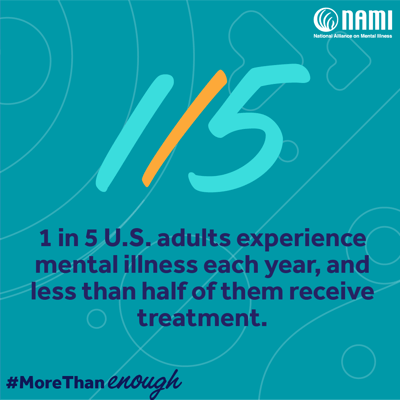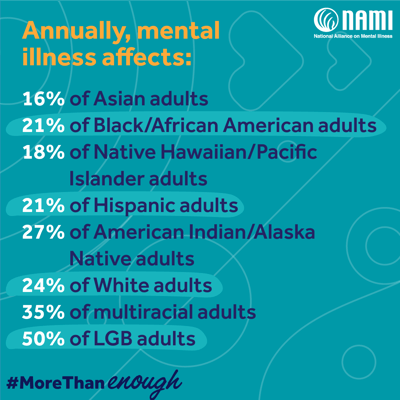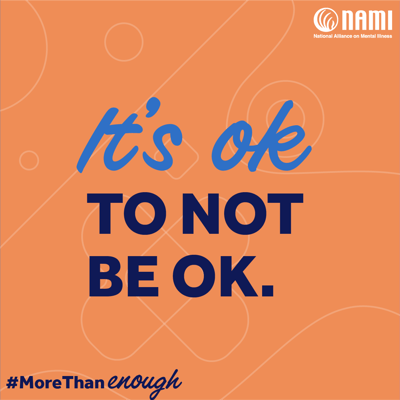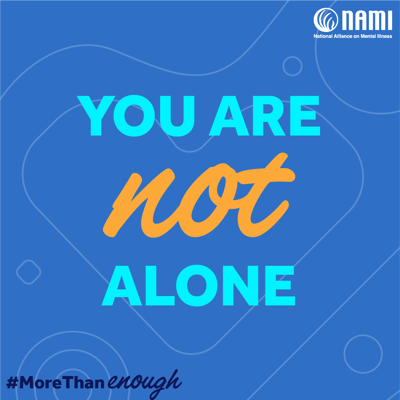Mental Health can often feel overwhelming and complex, with a multitude of conditions, symptoms, treatments, and stigmas. Resources and personal experiences are available and important to empower and spread knowledge.
Mental Health Awareness Month is dedicated to showcase the importance of mental health as well as physical health, which can be easy to overlook. But taking care of your mental wellbeing is crucial for living a happy, healthy life. Here are some tips for taking care of your mental health:
 Practicing mindfulness is the act of being fully present and non-judgmentally observing your thoughts and feelings. This can help reduce stress and anxiety, improve your mood, and increase focus and concentration. You can practice mindfulness through meditation, deep breathing, or simply paying attention to your surroundings.
Practicing mindfulness is the act of being fully present and non-judgmentally observing your thoughts and feelings. This can help reduce stress and anxiety, improve your mood, and increase focus and concentration. You can practice mindfulness through meditation, deep breathing, or simply paying attention to your surroundings.
 Sleep is essential for both physical and mental health. Lack of sleep can lead to increased stress, anxiety, and depression. Aim for seven to eight hours of sleep per night and establish a consistent sleep schedule.
Sleep is essential for both physical and mental health. Lack of sleep can lead to increased stress, anxiety, and depression. Aim for seven to eight hours of sleep per night and establish a consistent sleep schedule.
 Exercise is a great way to reduce stress and improve mood. It releases endorphins, which are natural feel-good chemicals in the brain. Most days of the week, aim for at least 30 minutes of moderate exercise, such as walking, biking, or swimming.
Exercise is a great way to reduce stress and improve mood. It releases endorphins, which are natural feel-good chemicals in the brain. Most days of the week, aim for at least 30 minutes of moderate exercise, such as walking, biking, or swimming.
 A healthy diet is important for both physical and mental health. Eating a diet rich in fruits, vegetables, whole grains, lean protein, and healthy fats can help reduce the risk of depression and anxiety.
A healthy diet is important for both physical and mental health. Eating a diet rich in fruits, vegetables, whole grains, lean protein, and healthy fats can help reduce the risk of depression and anxiety.
 Social connection is important for mental health. Make time for friends and family and participate in activities you enjoy. Joining a club or group with similar interests can also help you meet new people.
Social connection is important for mental health. Make time for friends and family and participate in activities you enjoy. Joining a club or group with similar interests can also help you meet new people.
 Stress can harm mental health. Finding healthy ways to manage stress is important, such as practicing relaxation techniques, delegating tasks, and setting realistic goals.
Stress can harm mental health. Finding healthy ways to manage stress is important, such as practicing relaxation techniques, delegating tasks, and setting realistic goals.
If you’re experiencing symptoms of mental illness, such as prolonged sadness, irrationality, or changes in sleep or appetite, it’s important to seek professional help. A mental health professional can provide diagnosis and treatment, which may include therapy, medication, or a combination of both.
Taking care of your mental health is crucial for your overall well-being. If you or someone you know is struggling, please take action. There are a number of resources available including:
- Mental Health America
- National Alliance of Mental Illness
- Substance Abuse and Mental Health Services Administration









Leave a Comment